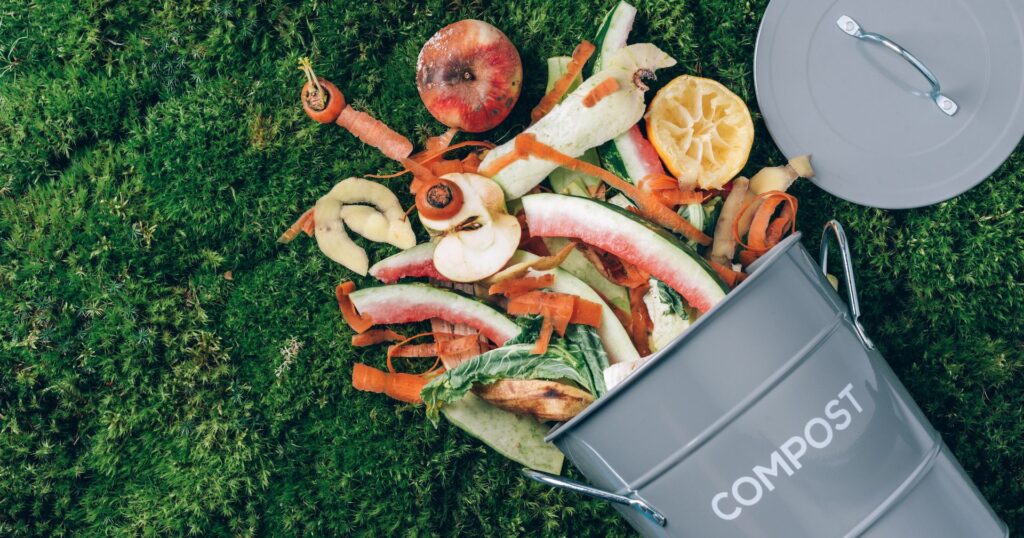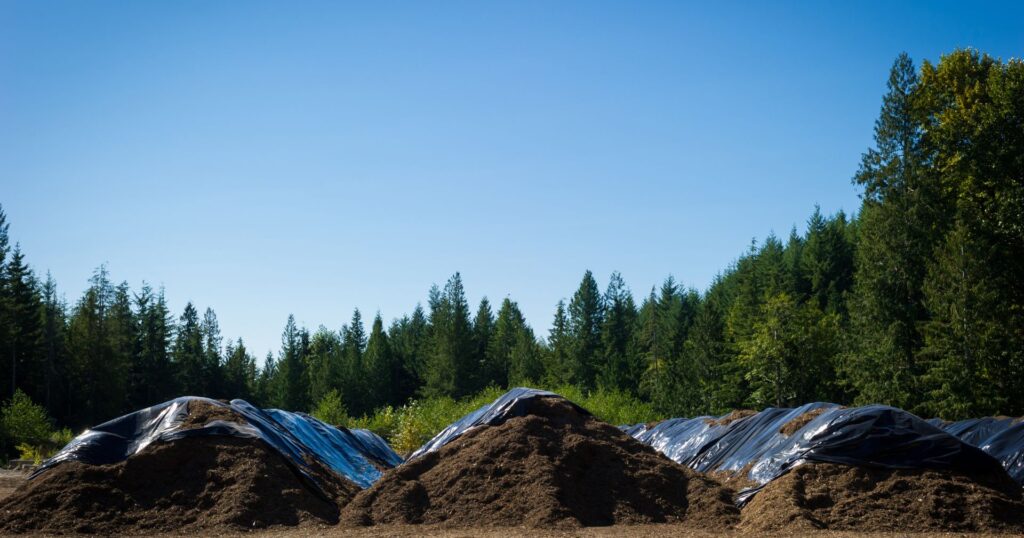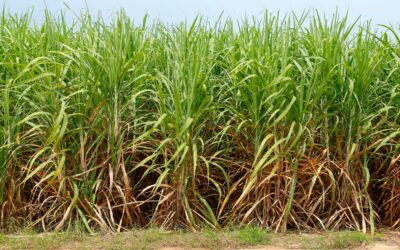Composting: It’s a word that frequently circulates discussions about sustainability and waste management, permeating every corner of the green living landscape. Crucial among methods is home composting and commercial composting.
Home composting is a grassroots effort, utilizing kitchen scraps and yard waste. On the other hand, commercial composting expands the process to an industrial scale, diverting waste from our landfills.
While both methods align with the shared goal of waste reduction, their approaches and implications differ vastly. Understanding these differences is vital in fully harnessing the potential of composting as part of a sustainable lifestyle.
In this article:
- What is commercial composting?
- Can you put commercially compostable items in a home compost?
- What is home composting?
- Bioplastics: Are they home or commercially compostable?
- Is compostable takeout packaging home or commercially compostable?
Home Composting versus Commercial Composting
In the quest for sustainable waste management solutions, composting stands out as a practical and environmentally responsible method. However, it’s important to understand that not all composting is created equal.
The composting process can be categorized broadly into two forms: home composting and commercial composting.
Home composting is an individual-based solution, while commercial composting happens on a larger scale. Some waste and compostable products are great for home composting, while others require specific conditions that commercial facilities can provide.
Learn More: Compostable vs Biodegradable: What’s the Difference?

What is commercial composting?
Commercial composting is an advanced, large-scale composting system that serves cities, communities, or industrial settings. These composting sites operate under carefully controlled conditions, utilizing the aerobic decomposition of organic materials to rapidly transform large amounts of waste into valuable soil.
What is aerobic composting?
The aerobic decomposition of organic matter uses microorganisms that require oxygen.
Commercial composting uses techniques such as in-vessel composting, windrow composting, and aerated static pile composting. The treated organic materials typically include green waste, food scraps, paper, and other compostable materials from various commercial and municipal facilities.
In terms of environmental impact, the commercial composting process reduces the volume of waste that would otherwise end up in landfills, consequently reducing greenhouse gas emissions. The resulting compost is a nutrient-rich, organic fertilizer that can be used for farming and gardening, contributing to circular economy efforts.
Commercial composting plays an important role in large-scale waste management and contributes significantly to soil sustainability and environmental conservation. However, commercial facilities are not always ideal, primarily due to accessibility.
Can you put commercially compostable items in home composts?
When a product is labelled as “commercially compostable,” it should only be composted in industrial or commercial composting facilities. Waste with this label is not home compostable.
Commercial facilities are designed to handle large volumes of various organic materials, including items that may not break down efficiently or safely in a home compost.
Composting in a home environment typically accommodates simpler, everyday organic materials such as fruit and vegetables, coffee grounds, and yard waste. However, certain materials, like meat or compostable products, require the high temperatures that commercial composting can reach to properly decompose.
Commercial composting facilities also strictly monitor conditions, such as temperature and moisture levels, to ensure optimum decomposition, safety, and hygiene. These facilities adhere to rigorous composting standards and regulations to produce safe, high-quality compost.

What is home composting?
Home composting is a simple, cost-effective method of recycling organic waste. It’s an excellent and accessible method of waste reduction with a positive environmental impact.
At its core, home composting involves the decomposition of organic materials, such as vegetable scraps, eggshells, and grass clippings. All of these items can be composted in a designated compost bin or pile in a garden.
The composting process relies on the natural breakdown of these materials by microorganisms, insects, and worms. This decomposition produces a nutrient-rich, soil-like substance that can enrich garden soil and improve plant growth.
Bioplastics: Home Compostable or Commercially Compostable?
Bioplastics represent a rapidly growing segment in the world of sustainable materials. But their end-of-life handling, especially their interaction with commercial and home composting, deserves a closer inspection.
Bioplastics should almost always be commercially composted, as they are designed to break down under specific conditions. If home composted, bioplastics can leave microplastics behind as they degrade, finding their way into our soil and food sources.
Commercial composting facilities maintain a controlled environment. They regularly turn compost piles and monitor moisture, expediting the decomposition process. These conditions are crucial for breaking down compostable bioplastics.
To add a layer of complexity, not all commercial composting facilities accept compostable bioplastics due to varying local regulations or processes. Additionally, these items cannot be recycled alongside conventional plastics, as they could potentially contaminate recycling streams.
Learn More: 4 Reasons Bioplastics Won’t Solve Our Plastic Problem

Compostable Takeout Packaging: Home or Commercially Compostable?
Compostable takeout packaging, such as containers, cutlery, and straws, are designed to break down in commercial composting facilities. This is because large, bulky, or complex products need specific environmental conditions to break down.
However, consumers without access to commercial composting facilities are left with limited eco-friendly disposal options, often resulting in landfill waste.
At Origin Sustainables, we develop products that are certified home compostable. Our takeout packaging and cutlery are crafted from materials designed to decompose in natural environments.
The ability to home compost empowers consumers who wish to make sustainable choices to decrease their ecological footprint. It also simplifies the composting process, creating lower barriers for sustainable living.
Learn More: 5 Innovative Sustainable Products for Restaurants
Why are composting certifications important?
In recent years, with the rise of eco-conscious consumers, there has been an increase in products claiming to be eco-friendly, biodegradable, or compostable. However, without proper certifications, such claims could lead to confusion or misrepresentation. This makes composting certifications a crucial part of the sustainability conversation.
Composting certifications offer an authoritative, third-party confirmation that products meet established industry standards for compostability. These certifications are a reliable way to verify a product will genuinely decompose in a specific composting environment – whether commercial or home.
For consumers, these certifications provide a clear guide on how to dispose of a product correctly and reduce the chance of compostable items ending up in landfills.
Learn More: Origin Sustainables’ Guide to Eco Certifications



